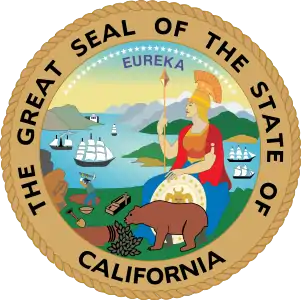El Dorado County, California
El Dorado County, officially the County of El Dorado, is a county in the U.S. state of California. As of the 2010 census, the population was 181,058.[3] The county seat is Placerville.[5]
El Dorado County, California | |
|---|---|
| County of El Dorado | |
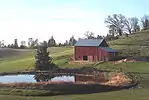 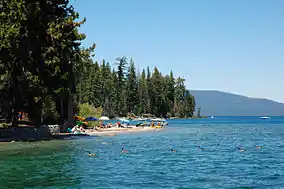 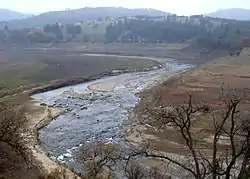 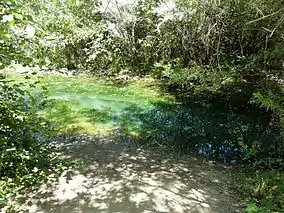 Images, from top down, left to right: A barn in El Dorado County, the shore of Lake Tahoe in Ed Z'berg Sugar Pine Point State Park, the South Fork American River running through the El Dorado hills, Marshall Gold Discovery State Historic Park | |
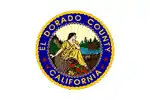 Flag 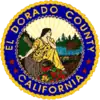 Seal | |
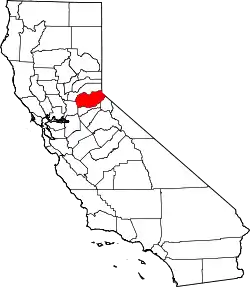 Location in the state of California | |
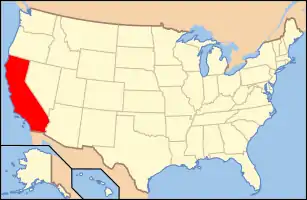 California's location in the United States | |
| Country | |
| State | |
| Regions | Northern California, Sierra Nevada, Gold Country |
| Metropolitan area | Greater Sacramento |
| Incorporated | February 18, 1850[1] |
| Named for | Spanish for "the golden" and El Dorado |
| County seat | Placerville |
| Largest city | El Dorado Hills |
| Area | |
| • Total | 1,786 sq mi (4,630 km2) |
| • Land | 1,708 sq mi (4,420 km2) |
| • Water | 78 sq mi (200 km2) |
| Highest elevation | 10,886 ft (3,318 m) |
| Population | |
| • Total | 181,058 |
| • Estimate (2019)[4] | 192,843 |
| • Density | 100/sq mi (39/km2) |
| Time zone | UTC−8 (Pacific Time Zone) |
| • Summer (DST) | UTC−7 (Pacific Daylight Time) |
| ZIP code | 95762 |
| Area code | 530, 916, 279 |
| FIPS code | 06-017 |
| GNIS feature ID | 277273 |
| Website | www.edcgov.us |
El Dorado County is part of the Sacramento-Roseville-Arden-Arcade, CA Metropolitan Statistical Area. It is located entirely in the Sierra Nevada, from the historic Gold Country in the western foothills to the High Sierra in the east.
El Dorado County's population has grown as Greater Sacramento has expanded into the region. In the county's Lake Tahoe area, environmental awareness and environmental protection initiatives have grown along with the population since the 1960 Winter Olympics, hosted at Squaw Valley Ski Resort in neighboring Placer County.
History
What is now known as El Dorado County has been home to the Maidu, Washoe, and Miwok Indigenous American nations for centuries. The region became famous for being the site of the 1848 gold discovery that sparked the California Gold Rush.[6] The County of El Dorado was one of California's original 27 counties created effective February 18, 1850 (the number has risen to 58 today). Its name is derived from the Spanish meaning "the gilded/golden".[7]
The final segments of the Pony Express mail route ran through El Dorado County until its replacement with the telegraph service in 1861; U.S. Highway 50 follows the Pony Express route today.
- Mother lode
- James W. Marshall
- California Mining and Mineral Museum
- Local landmarks:
- Marshall Gold Discovery State Historic Park
- Confidence Hall
- Fountain-Tallman Soda Works
- John Pearson Soda Works
- Combellack-Blair House
- Rubicon Point Light
The Placerville Mountain Democrat, California's oldest surviving newspaper, serves El Dorado County.
Government and policing
Policing
The El Dorado County Sheriff provides court protection, county jail administration, and coroner service for all of the county and provides patrol and detective services for the unincorporated areas of the county. Placerville, population 11,000, has a municipal police department, as does South Lake Tahoe, population 22,000.
Sheriffs
- James Hume (18 Feb 1850- 7 Nov 1852)
- Steven Charles Austin (7 Nov 1852- 7 Nov 1856)
- William Tanner Henson (7 Nov 1856- 15 Sep 1859) - Resigned
- Walter J. Burwell (15 Sep 1859- 15 Aug 1863) - Resigned
- Henry Gooding (15 Aug 1863- 7 Nov 1867)
- Jacob Hart Neff (7 Nov 1867- 7 Nov 1871)
- Charles Benjamin Dunnam (7 Niv 1871- 7 Nov 1875)
- Jason McCormick (7 Nov 1875- 7 Nov 1881)
- George Burnham (7 Nov 1881- 7 Nov 1883)
- Thomas Augustus Galt (7 Nov 1883- 7 Nov 1887)
- George H. Hilbert (7 Nov 1887- 7 Nov 1898)
- Archie Speer Bosquit (7 Nov 1898- 7 Nov 1907)
- Gilbert Cook (7 Nov 1907- 9 May 1912) - Suicide
- Albert George Bradshaw (9 May 1912- 7 Nov 1914)
- Charles E. Hand (7 Nov 1914- 7 Nov 1925)
- Charles F. Woods (7 Nov 1925- 7 Nov 1931)
- George Martin Smith Sr. 7 Nov 1931- 7 Nov 1941)
- Lowell Fred West (7 Nov 1941- 7 Nov 1949)
- Rowland Lee Morris (7 Nov 1949- 7 Nov 1955)
- Ernie Carlson (7 Nov 1955- 7 Nov 1965)
- Robert Mitchum (7 Nov 1965- 7 Nov 1971)
- Ernie Carlson (7 Nov 1971- 7 Nov 1975)
- Al Coombs (7 Nov 1975-7 Nov 1977)
- Richard "Dick" Pacileo (7 Nov 1977- 7 Nov 2001)
- Jeff Neves ( 7 Nov 2001- 7 Nov 2010)'
- John D'Agostini (7 Nov 2010- )
Geography
According to the U.S. Census Bureau, the county has a total area of 1,786 square miles (4,630 km2), of which 1,708 square miles (4,420 km2) is land and 78 square miles (200 km2) (4.4%) is water.[8]
The county, owing to its location in the Sierra Nevada, consists of rolling hills and mountainous terrain. The northeast corner is in the Lake Tahoe Basin (part of the Great Basin), including a portion of the lake itself. Across the Sierra crest to the west lies the majority of the county, referred to as the “western slope.” A portion of Folsom Lake is in the northwest corner of the county.
Much of the county is public land. The Eldorado National Forest comprises a significant portion (approximately 43%) of the county's land area, primarily on the western slope. The Lake Tahoe Basin Management Unit, formerly part of the Eldorado and two other National Forests, manages much of the land east of the crest. The Pacific Crest Trail runs through the eastern part of the county, along or roughly paralleling the Sierra crest. The county is home to the Desolation Wilderness, a popular destination for hiking, backpacking, and fishing.
Adjacent counties
- Placer County - north
- Douglas County, Nevada - northeast
- Alpine County - southeast
- Amador County - south
- Sacramento County - southwest
Geographic features
- American River
- Carson Range
- Crystal Range
- Echo Lake
- Fallen Leaf Lake
- Folsom Lake
- Francis Lake
- Freel Peak[9] as its highest point at 10,886 feet (3,318 m)
- Gilmore Lake
- Green Springs Ranch
- Lake Tahoe
- Loon Lake
- Lost Lake
- Mount Price
- Mount Tallac
- Pyramid Lake
- Sierra Nevada
- Silver Peak
- Talking Mountain
- Union Valley Reservoir
- Waca Lake
Recreation
Parks
Racing
Demographics
2011
| Population, race, and income | |||||
|---|---|---|---|---|---|
| Total population[10] | 179,878 | ||||
| White[10] | 157,853 | 87.8% | |||
| Black or African American[10] | 1,367 | 0.8% | |||
| American Indian or Alaska Native[10] | 1,802 | 1.0% | |||
| Asian[10] | 6,260 | 3.5% | |||
| Native Hawaiian or other Pacific Islander[10] | 167 | 0.1% | |||
| Some other race[10] | 6,323 | 3.5% | |||
| Two or more races[10] | 6,106 | 3.4% | |||
| Hispanic or Latino (of any race)[11] | 21,222 | 11.8% | |||
| Per capita income[12] | $34,385 | ||||
| Median household income[13] | $68,815 | ||||
| Median family income[14] | $82,930 | ||||
Places by population, race, and income
| Places by population and race | ||||||||
|---|---|---|---|---|---|---|---|---|
| Place | Type[15] | Population[10] | White[10] | Other[10] [note 1] |
Asian[10] | Black or African American[10] |
Native American[10] [note 2] |
Hispanic or Latino (of any race)[11] |
| Auburn Lake Trails | CDP | 3,741 | 97.0% | 1.5% | 0.2% | 1.0% | 0.3% | 2.3% |
| Cameron Park | CDP | 16,697 | 90.8% | 6.1% | 2.2% | 0.6% | 0.4% | 15.4% |
| Camino | CDP | 1,933 | 98.7% | 0.7% | 0.3% | 0.4% | 0.0% | 3.5% |
| Cold Springs | CDP | 569 | 90.9% | 9.1% | 0.0% | 0.0% | 0.0% | 3.3% |
| Coloma | CDP | 353 | 82.4% | 17.3% | 0.3% | 0.0% | 0.0% | 20.1% |
| Diamond Springs | CDP | 11,367 | 93.6% | 2.3% | 1.3% | 0.7% | 2.1% | 9.4% |
| El Dorado Hills | CDP | 43,563 | 84.0% | 5.4% | 8.9% | 1.7% | 0.1% | 7.3% |
| Georgetown | CDP | 2,338 | 89.9% | 8.2% | 0.0% | 0.1% | 1.8% | 10.7% |
| Grizzly Flats | CDP | 923 | 97.4% | 0.0% | 0.9% | 0.0% | 1.7% | 6.7% |
| Placerville | City | 10,394 | 82.5% | 12.0% | 2.0% | 0.7% | 2.9% | 19.4% |
| Pollock Pines | CDP | 6,953 | 95.2% | 3.6% | 0.8% | 0.0% | 0.4% | 9.8% |
| Shingle Springs | CDP | 4,797 | 92.7% | 2.0% | 0.0% | 0.7% | 4.6% | 16.7% |
| South Lake Tahoe | City | 21,814 | 76.8% | 16.8% | 4.5% | 0.6% | 1.3% | 31.3% |
| Tahoma ‡ | CDP | 563 | 82.8% | 17.2% | 0.0% | 0.0% | 0.0% | 8.5% |
| ‡ Data for El Dorado County area of this CDP | ||||||||
| Places by population and income | |||||
|---|---|---|---|---|---|
| Place | Type[15] | Population[16] | Per capita income[12] | Median household income[13] | Median family income[14] |
| Auburn Lake Trails | CDP | 3,741 | $35,522 | $79,573 | $92,308 |
| Cameron Park | CDP | 16,697 | $34,839 | $72,562 | $84,361 |
| Camino | CDP | 1,933 | $26,015 | $51,742 | $63,412 |
| Cold Springs (El Dorado County) | CDP | 569 | $30,925 | $97,576 | $99,286 |
| Coloma | CDP | 353 | $22,462 | $44,844 | $44,844 |
| Diamond Springs | CDP | 11,367 | $28,786 | $52,911 | $62,150 |
| El Dorado Hills | CDP | 43,563 | $44,920 | $115,121 | $123,816 |
| Georgetown | CDP | 2,338 | $24,117 | $52,169 | $62,614 |
| Grizzly Flats | CDP | 923 | $20,902 | $32,365 | $56,813 |
| Placerville | City | 10,394 | $26,109 | $53,385 | $66,890 |
| Pollock Pines | CDP | 6,953 | $30,826 | $54,478 | $62,760 |
| Shingle Springs | CDP | 4,797 | $34,055 | $86,786 | $89,778 |
| South Lake Tahoe | City | 21,814 | $22,958 | $41,685 | $51,538 |
| Tahoma ‡ | CDP | 563 | $32,105 | $54,286 | $63,646 |
| ‡ Data for El Dorado County area of this CDP | |||||
2010
| Historical population | |||
|---|---|---|---|
| Census | Pop. | %± | |
| 1850 | 20,057 | — | |
| 1860 | 20,562 | 2.5% | |
| 1870 | 10,309 | −49.9% | |
| 1880 | 10,683 | 3.6% | |
| 1890 | 9,232 | −13.6% | |
| 1900 | 8,986 | −2.7% | |
| 1910 | 7,492 | −16.6% | |
| 1920 | 6,426 | −14.2% | |
| 1930 | 8,325 | 29.6% | |
| 1940 | 13,229 | 58.9% | |
| 1950 | 16,207 | 22.5% | |
| 1960 | 29,390 | 81.3% | |
| 1970 | 43,833 | 49.1% | |
| 1980 | 85,812 | 95.8% | |
| 1990 | 125,955 | 46.8% | |
| 2000 | 156,299 | 24.1% | |
| 2010 | 181,058 | 15.8% | |
| 2019 (est.) | 192,843 | [4] | 6.5% |
| U.S. Decennial Census[17] 1790–1960[18] 1900–1990[19] 1990–2000[20] 2010–2015[3] | |||
The 2010 United States Census reported that El Dorado County had a population of 181,058. The racial makeup of El Dorado County was 156,793 (86.6%) White, 1,409 (0.8%) African American, 2,070 (1.1%) Native American, 6,297 (3.5%) Asian, 294 (0.2%) Pacific Islander, 7,278 (4.0%) from other races, and 6,917 (3.8%) from two or more races. Hispanic or Latino of any race were 21,875 persons (12.1%).[21] The largest growth in the county has come in El Dorado Hills where the population grew by 24,092 residents to a total of 42,108 since 2000.[21]
| Population reported at 2010 United States Census | |||||||||
|---|---|---|---|---|---|---|---|---|---|
Population | American | American | Islander | races | more races | or Latino (of any race) | |||
| El Dorado County | 181,058 | 156,793 | 1,409 | 2,070 | 6,297 | 294 | 7,278 | 6,917 | 21,875 |
cities | Population | American | American | Islander | races | more races | or Latino (of any race) | ||
| Placerville | 10,389 | 8,716 | 80 | 162 | 98 | 13 | 867 | 453 | 1,863 |
| South Lake Tahoe | 21,403 | 15,733 | 182 | 232 | 1,186 | 39 | 3,230 | 801 | 6,665 |
places | Population | American | American | Islander | races | more races | or Latino (of any race) | ||
| Auburn Lake Trails | 3,426 | 3,190 | 6 | 28 | 36 | 5 | 45 | 116 | 208 |
| Cameron Park | 18,228 | 16,242 | 143 | 194 | 425 | 36 | 461 | 727 | 2,056 |
| Camino | 1,750 | 1,604 | 7 | 14 | 18 | 4 | 55 | 48 | 197 |
| Cold Springs | 446 | 413 | 4 | 5 | 3 | 0 | 15 | 6 | 43 |
| Coloma | 529 | 462 | 4 | 3 | 8 | 0 | 15 | 37 | 63 |
| Diamond Springs | 11,037 | 9,743 | 39 | 176 | 110 | 6 | 518 | 445 | 1,377 |
| El Dorado Hills | 42,108 | 35,089 | 615 | 196 | 3,563 | 71 | 681 | 1,893 | 3,802 |
| Georgetown | 2,367 | 2,128 | 47 | 59 | 18 | 2 | 45 | 68 | 177 |
| Grizzly Flats | 1,066 | 954 | 6 | 14 | 7 | 2 | 19 | 64 | 96 |
| Pollock Pines | 6,871 | 6,195 | 18 | 128 | 56 | 3 | 251 | 220 | 713 |
| Shingle Springs | 4,432 | 3,919 | 14 | 108 | 50 | 3 | 132 | 206 | 469 |
| Tahoma‡ | 780 | 736 | 2 | 7 | 7 | 0 | 11 | 17 | 35 |
unincorporated areas | Population | American | American | Islander | races | more races | or Latino (of any race) | ||
| All others not CDPs (combined) | 56,226 | 51,669 | 242 | 744 | 712 | 110 | 933 | 1,816 | 4,111 |
| ‡ Note: these numbers reflect only the portion of this CDP in El Dorado County | |||||||||
2000
As of the census[22] of 2000, there were 156,299 people, 58,939 households, and 43,025 families residing in the county. The population density was 91 people per square mile (35/km2). There were 71,278 housing units at an average density of 42 per square mile (16/km2). The racial makeup of the county was 89.7% White, 0.5% Black or African American, 1.0% Native American, 2.1% Asian, 0.1% Pacific Islander, 3.6% from other races, and 3.0% from two or more races. 9.3% of the population were Hispanic or Latino of any race. 14.9% were of German, 13.4% English, 10.3% Irish, 6.6% Italian and 6.6% American ancestry according to Census 2000. 90.5% spoke English and 6.5% Spanish as their first language.
There were 58,939 households, out of which 34.2% had youngsters under the age of 18 living with them, 60.1% were married couples living together, 8.9% had a female householder with no husband present, and 27.0% were non-families. 20.1% of all households were made up of individuals, and 7.3% had someone living alone who was 65 years of age or older. The average household size was 2.63 and the average family size was 3.04.
In the county, the population was spread out, with 26.1% under the age of 18, 6.8% from 18 to 24, 27.8% from 25 to 44, 26.9% from 45 to 64, and 12.4% who were 65 years of age or older. The median age was 39 years. For every 100 females, there were 99.5 males. For every 100 females age 18 and over, there were 97.3 males.
The 2000 census also states that the median income for a household in the county was $51,484, and the median income for a family was $60,250. Males had a median income of $46,373 versus $31,537 for females. The per capita income for the county was $25,560. About 5.0% of families and 7.1% of the population were below the poverty line, including 7.6% of those under age 18 and 5.0% of those age 65 or over.
Politics
Voter registration statistics
| Population and registered voters | ||
|---|---|---|
| Total population[10] | 179,878 | |
| Registered voters[23][note 3] | 110,206 | 61.3% |
| Democratic[23] | 32,176 | 29.2% |
| Republican[23] | 48,362 | 43.9% |
| Democratic–Republican spread[23] | -16,186 | -14.7% |
| American Independent[23] | 4,214 | 3.8% |
| Green[23] | 887 | 0.8% |
| Libertarian[23] | 1,010 | 0.9% |
| Peace and Freedom[23] | 293 | 0.3% |
| Americans Elect[23] | 5 | 0.0% |
| Other[23] | 883 | 0.8% |
| No party preference[23] | 22,376 | 20.3% |
Cities by population and voter registration
| Cities by population and voter registration | |||||||
|---|---|---|---|---|---|---|---|
| City | Population[10] | Registered voters[23] [note 3] |
Democratic[23] | Republican[23] | D–R spread[23] | Other[23] | No party preference[23] |
| Placerville | 10,394 | 52.9% | 34.0% | 37.4% | -3.4% | 11.5% | 21.3% |
| South Lake Tahoe | 21,814 | 42.4% | 38.6% | 22.8% | +15.8% | 14.0% | 29.0% |
Overview
El Dorado is a predominantly Republican county in presidential and congressional elections. However, from 1880 until 1952, the county was a Democratic stronghold, with Theodore Roosevelt and Warren Harding being the only two Republicans to carry the county. Since 1952, however, El Dorado has gone Democratic only three times: in 1960 narrowly for John F. Kennedy, in 1964 in a landslide for Lyndon Johnson, and in 1976 narrowly for Jimmy Carter.
| Year | GOP | DEM | Others |
|---|---|---|---|
| 2020 | 53.2% 61,838 | 44.4% 51,621 | 2.3% 2,700 |
| 2016 | 51.8% 49,247 | 38.3% 36,404 | 10.0% 9,498 |
| 2012 | 57.3% 50,973 | 39.5% 35,166 | 3.2% 2,859 |
| 2008 | 53.9% 50,314 | 43.4% 40,529 | 2.6% 2,466 |
| 2004 | 61.2% 52,878 | 37.3% 32,242 | 1.4% 1,244 |
| 2000 | 58.3% 42,045 | 36.4% 26,220 | 5.4% 3,871 |
| 1996 | 51.8% 32,759 | 36.3% 22,957 | 11.8% 7,480 |
| 1992 | 39.9% 25,906 | 32.4% 21,012 | 27.7% 17,969 |
| 1988 | 59.3% 30,021 | 39.1% 19,801 | 1.5% 781 |
| 1984 | 64.9% 27,583 | 33.7% 14,312 | 1.4% 583 |
| 1980 | 58.3% 21,238 | 29.5% 10,765 | 12.2% 4,446 |
| 1976 | 47.7% 12,472 | 48.8% 12,763 | 3.5% 919 |
| 1972 | 54.2% 11,330 | 41.4% 8,654 | 4.4% 921 |
| 1968 | 49.0% 7,468 | 39.7% 6,054 | 11.3% 1,719 |
| 1964 | 39.5% 5,775 | 60.3% 8,810 | 0.2% 25 |
| 1960 | 49.2% 6,065 | 50.1% 6,175 | 0.8% 97 |
| 1956 | 53.6% 4,613 | 46.0% 3,957 | 0.4% 37 |
| 1952 | 60.5% 5,203 | 38.4% 3,297 | 1.1% 98 |
| 1948 | 43.0% 2,894 | 52.0% 3,493 | 5.0% 337 |
| 1944 | 39.6% 1,990 | 59.9% 3,016 | 0.5% 25 |
| 1940 | 32.4% 2,019 | 66.4% 4,144 | 1.2% 74 |
| 1936 | 23.1% 1,228 | 75.7% 4,019 | 1.2% 65 |
| 1932 | 23.1% 956 | 73.4% 3,034 | 3.5% 145 |
| 1928 | 44.3% 1,228 | 54.6% 1,516 | 1.1% 31 |
| 1924 | 28.5% 852 | 12.1% 361 | 59.5% 1,778 |
| 1920 | 64.4% 1,636 | 28.6% 726 | 7.1% 180 |
| 1916 | 35.1% 1,068 | 57.7% 1,755 | 7.2% 220 |
| 1912 | 0.6% 16 | 59.0% 1,613 | 40.4% 1,103 |
| 1908 | 44.7% 986 | 46.2% 1,019 | 9.0% 199 |
| 1904 | 54.1% 1,248 | 37.5% 865 | 8.4% 194 |
| 1900 | 45.1% 1,193 | 53.2% 1,406 | 1.7% 44 |
| 1896 | 39.5% 1,130 | 58.6% 1,674 | 1.9% 54 |
| 1892 | 43.8% 1,159 | 48.0% 1,270 | 8.2% 217 |
| 1888 | 47.0% 1,350 | 50.7% 1,456 | 2.3% 65 |
| 1884 | 45.5% 1,289 | 51.8% 1,469 | 2.7% 77 |
| 1880 | 47.9% 1,419 | 51.3% 1,520 | 0.8% 24 |
| Election results from statewide races | ||
|---|---|---|
| Year | Office | Results |
| 2010 | Governor | Whitman 56.2 - 38.6% |
| Lieutenant Governor | Maldonado 55.6 - 32.8% | |
| Secretary of State | Dunn 53.5 - 37.4% | |
| Controller | Chiang 46.1 - 45.7% | |
| Treasurer | Walters 51.3 - 41.0% | |
| Attorney General | Cooley 60.4 - 29.4% | |
| Insurance Commissioner | Villines 53.6 - 33.8% | |
The county is noted as a center of political concern with the United Nations non-binding sustainable development plan Agenda 21, which was on the County Board of Supervisors meeting Agenda on May 15, 2012. Concerns included the threat of U.S. Forest Service road closures and traffic roundabouts.[25] On February 19, 2013, 14 members of the El Dorado County Grand Jury resigned, forcing Supervising Judge Steven Bailey to dissolve it.[26]
El Dorado County is in California's 4th congressional district, represented by Republican Tom McClintock.[27] In the State Assembly, the county is split between the 5th Assembly District, represented by Republican Frank Bigelow and the 6th Assembly District, represented by Republican Kevin Kiley.[28] In the State Senate, it is in the 1st Senate District, represented by Republican Brian Dahle.[29]
Crime
The following table includes the number of incidents reported and the rate per 1,000 persons for each type of offense.
| Population and crime rates | ||
|---|---|---|
| Population[10] | 179,878 | |
| Violent crime[30] | 520 | 2.89 |
| Homicide[30] | 3 | 0.02 |
| Forcible rape[30] | 50 | 0.28 |
| Robbery[30] | 71 | 0.39 |
| Aggravated assault[30] | 396 | 2.20 |
| Property crime[30] | 1,736 | 9.65 |
| Burglary[30] | 932 | 5.18 |
| Larceny-theft[30][31] | 1,540 | 8.56 |
| Motor vehicle theft[30] | 178 | 0.99 |
| Arson[30] | 17 | 0.09 |
Cities by population and crime rates
| City | Population[32] | Violent crimes[32] | Violent crime rate per 1,000 persons |
Property crimes[32] | Property crime rate per 1,000 persons |
|---|---|---|---|---|---|
| Placerville | 10,479 | 55 | 5.25 | 194 | 18.51 |
| South Lake Tahoe | 21,586 | 148 | 6.86 | 544 | 25.20 |
Transportation
Major highways
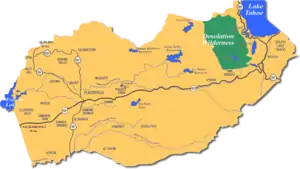
.svg.png.webp) U.S. Route 50
U.S. Route 50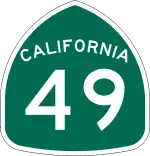 State Route 49
State Route 49 State Route 89
State Route 89 State Route 193
State Route 193- Luther Pass
Public transportation
- El Dorado Transit[33] runs local service in Placerville and surrounding areas (as far east as Pollock Pines). Commuter service into Sacramento and Folsom is also provided.
- Tahoe Transportation District http://tahoetransportation.org/ is the transit operator for the South Lake Tahoe area. Service also runs into the state of Nevada.
Airports
General aviation airports include Placerville Airport, Georgetown Airport, Cameron Park airport and Lake Tahoe Airport.
Asbestos
Portions of El Dorado County are known to contain natural asbestos formations near the surface.[34] The USGS studied amphiboles in rock and soil in the area in response to an EPA sampling study and subsequent criticism of the EPA study. The study found that many amphibole particles in the area meet the counting rule criteria used by the EPA for chemical and morphological limits, but do not meet morphological requirements for commercial-grade-asbestos. The executive summary pointed out that even particles that do not meet requirements for commercial-grade-asbestos may be a health threat and suggested a collaborative research effort to assess health risks associated with naturally occurring asbestos.[35]
In 2003 after construction of the Oak Ridge High School (El Dorado Hills) soccer field, the federal Agency for Toxic Substances and Disease Registry found that some student athletes, coaches and school workers had received substantial exposures. The inside of the school needed to be cleaned of dust.[34]
Sister relationships
 Warabi, Saitama Prefecture, Japan is a sister municipality to El Dorado County, California on 26 March 1975.
Warabi, Saitama Prefecture, Japan is a sister municipality to El Dorado County, California on 26 March 1975.
Communities
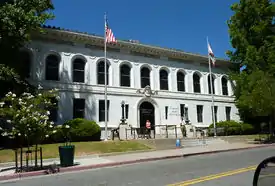
Cities
- Placerville (county seat)
- South Lake Tahoe
Census-designated places
Other unincorporated communities
- Camp Richardson
- Camp Sacramento
- Cool
- Echo Lake
- El Dorado
- Fair Play
- Garden Valley
- Greenwood
- Happy Valley
- Kyburz
- Meyers
- Omo Ranch
- Outingdale
- Phillips
- Pilot Hill
- Rescue
- Somerset
- Strawberry
- Twin Bridges
Population ranking
The population ranking of the following table is based on the 2010 census of El Dorado County.[37]
† county seat
| Rank | City/town/etc. | Municipal type | Population (2010 Census) |
|---|---|---|---|
| 1 | El Dorado Hills | CDP | 42,108 |
| 2 | South Lake Tahoe | City | 21,403 |
| 3 | Cameron Park | CDP | 18,228 |
| 4 | Diamond Springs | CDP | 11,037 |
| 5 | † Placerville | City | 10,389 |
| 6 | Pollock Pines | CDP | 6,871 |
| 7 | Shingle Springs | CDP | 4,432 |
| 8 | Auburn Lake Trails | CDP | 3,426 |
| 9 | Georgetown | CDP | 2,367 |
| 10 | Camino | CDP | 1,750 |
| 11 | Tahoma (partially in Placer County) | CDP | 1,191 |
| 12 | Grizzly Flats | CDP | 1,066 |
| 13 | Coloma | CDP | 529 |
| 14 | Cold Springs | CDP | 446 |
| 15 | Shingle Springs Rancheria[38] | AIAN | 102 |
See also
Notes
- Other = Some other race + Two or more races
- Native American = Native Hawaiian or other Pacific Islander + American Indian or Alaska Native
- Percentage of registered voters with respect to total population. Percentages of party members with respect to registered voters follow.
References
- "Chronology". California State Association of Counties. Retrieved February 6, 2015.
- "Freel Peak". Peakbagger.com. Retrieved February 6, 2015.
- "State & County QuickFacts". United States Census Bureau. Archived from the original on July 9, 2011. Retrieved April 3, 2016.
- "American FactFinder". Archived from the original on February 14, 2020. Retrieved April 19, 2019.
- "Find a County". National Association of Counties. Archived from the original on 2012-07-12. Retrieved 2011-06-07.
- Irish, Marc Charles. "Brief History of El Dorado County | El Dorado County, CAGenWeb | Marc Charles Irish". www.cagenweb.com. Retrieved 2016-03-23.
- Gannett, Henry (1905). The Origin of Certain Place Names in the United States. Govt. Print. Off. pp. 116.
- "2010 Census Gazetteer Files". United States Census Bureau. August 22, 2012. Retrieved September 24, 2015.
- "Freel Peak : Climbing, Hiking & Mountaineering : SummitPost". www.summitpost.org. Retrieved 15 March 2018.
- U.S. Census Bureau. American Community Survey, 2011 American Community Survey 5-Year Estimates, Table B02001. U.S. Census website . Retrieved 2013-10-26.
- U.S. Census Bureau. American Community Survey, 2011 American Community Survey 5-Year Estimates, Table B03003. U.S. Census website . Retrieved 2013-10-26.
- U.S. Census Bureau. American Community Survey, 2011 American Community Survey 5-Year Estimates, Table B19301. U.S. Census website . Retrieved 2013-10-21.
- U.S. Census Bureau. American Community Survey, 2011 American Community Survey 5-Year Estimates, Table B19013. U.S. Census website . Retrieved 2013-10-21.
- U.S. Census Bureau. American Community Survey, 2011 American Community Survey 5-Year Estimates, Table B19113. U.S. Census website . Retrieved 2013-10-21.
- U.S. Census Bureau. American Community Survey, 2011 American Community Survey 5-Year Estimates. U.S. Census website . Retrieved 2013-10-21.
- U.S. Census Bureau. American Community Survey, 2011 American Community Survey 5-Year Estimates, Table B01003. U.S. Census website . Retrieved 2013-10-21.
- "U.S. Decennial Census". United States Census Bureau. Retrieved September 24, 2015.
- "Historical Census Browser". University of Virginia Library. Retrieved September 24, 2015.
- Forstall, Richard L., ed. (March 27, 1995). "Population of Counties by Decennial Census: 1900 to 1990". United States Census Bureau. Retrieved September 24, 2015.
- "Census 2000 PHC-T-4. Ranking Tables for Counties: 1990 and 2000" (PDF). United States Census Bureau. April 2, 2001. Retrieved September 24, 2015.
- "2010 Census P.L. 94-171 Summary File Data". United States Census Bureau.
- "U.S. Census website". United States Census Bureau. Retrieved 2011-05-14.
- California Secretary of State. February 10, 2013 - Report of Registration Archived November 3, 2013, at the Wayback Machine. Retrieved 2013-10-31.
- Leip, David. "Dave Leip's Atlas of U.S. Presidential Elections". uselectionatlas.org. Retrieved 15 March 2018.
- Carlos Alcalá (May 24, 2012). "El Dorado County folks riled by U.N. agenda for sustainable growth". Sacramento Bee. Archived from the original on April 11, 2013. Retrieved March 10, 2013.
- Cathy Locke (March 10, 2013). "The Public Eye: El Dorado County grand jury disbands after mass resignation". Sacramento Bee. Archived from the original on March 12, 2013. Retrieved March 10, 2013.
- "California's 4th Congressional District - Representatives & District Map". Civic Impulse, LLC. Retrieved March 1, 2013.
- "Members Assembly". State of California. Retrieved April 5, 2013.
- "Senators". State of California. Retrieved April 5, 2013.
- Office of the Attorney General, Department of Justice, State of California. Table 11: Crimes – 2009 Archived December 2, 2013, at the Wayback Machine. Retrieved 2013-11-14.
- Only larceny-theft cases involving property over $400 in value are reported as property crimes.
- United States Department of Justice, Federal Bureau of Investigation. Crime in the United States, 2012, Table 8 (California). Retrieved 2013-11-14.
- "El Dorado Transit - El Dorado Transit: Public Transportation for El Dorado County, California". www.eldoradotransit.com. Retrieved 15 March 2018.
- Raloff, Janet (July 8, 2006), "Dirty Little Secret", Science News, archived from the original (– Scholar search) on July 13, 2007
- Meeker, G.P.; Lowers, H.A.; Swayze, G.A.; Van Gosen, B.S.; Stutley, S.J.; Brownfield, I.K. (December 2006), Mineralogy and Morphology of Amphiboles Observed in Soils and Rocks in El Dorado Hills, California, United States Geological Survey
- https://www.sf.us.emb-japan.go.jp/itpr_en/e_m07_06_01.html
- "2010 U.S. Census website". United States Census Bureau. Retrieved 2013-02-10.
- Staff, Website Services & Coordination. "US Census Bureau 2010 Census Interactive Population Map". www.census.gov. Retrieved 15 March 2018.
External links
| Wikimedia Commons has media related to El Dorado County, California. |
- Official website

- El Dorado County Deeds, 1873-1930.
- official El Dorado County Historical Museum website
- El Dorado Environmental air quality management - naturally occurring asbestos information
- El Dorado County Weather
- El Dorado County Visitors Authority
- Sierra Community Access Television
- El Dorado Western Railway Foundation blog - The railway is restoring the Diamond & Caldor No. 4 Shay locomotive at the El Dorado County Historical Museum.
